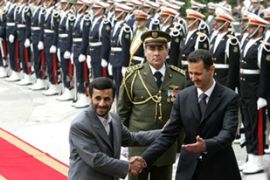Syrian president arrives in Iran
Leaders are expected to discuss regional instability and how to counter US pressure.

Accompanied by Walid Muallem, Syrian foreign minister, and Faruq al-Shara, Syria’s vice president, al-Assad is to meet Akbar Hashemi Rafsanjani, Iran’s former president later on Saturday.
Ahmadinejad said after al-Assad’s last visit that the strong relations between Iran and Syria “makes our enemies angry”, in a reference to the US.
Al-Assad’s latest visit to Tehran comes at a time when both Syria and Iran have been accused by the US of “meddling” in the region. Both deny the charges.
| Your Views |
|
“I believe there is a widely available diplomatic solution that the people of both America and Iran want”
|
Washington accuses the two countries of helping to stir up insecurity in Iraq by supporting armed groups and allowing fighters to cross their borders.
Earlier this week, both borders were closed in the initial stages of an Iraq security crackdown.
But Brigadier Qassim Moussawi, a spokesman for the officer overseeing the plan, said on Saturday that Iraq will re-open its borders with Iran and Syria.
He said: “Seventy-two hours have passed and the borders will gradually re-open, but it will take 60 days for the border crossings to return to normal.”
He said the closure was mainly to allow for the smooth deployment of additional security forces in Baghdad, where US and Iraqi troops have stepped up an operation to try to stabilise the capital.
Syria-Iran unity
Seyed Mohammad Marandi, a political analyst with Tehran University, said: “Many fear the United States is looking for scapegoats in order to put the blame on them, so Iran and Syria feel they have to be united in this period.
“Both sides have a moral obligation to each other, it’s more than just a strategic alliance.”
Damascus has also been accused of fomenting the violence that has wracked Lebanon since the assassination Rafiq al-Hariri, a former prime minister, in 2005, while Tehran stands accused of arming the Shia group Hezbollah.
Syria is a supporter of Iran‘s nuclear programme, which the US alleges is a cover for making nuclear weapons. Iran insists its atomic drive is solely aimed at generating energy.